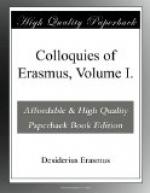confess to Christ himself, answers that it will satisfy
his mind, if the fathers of the Church were of the
same opinion. From this my critic argues, not
with dialectic art, but with rascally cunning, that
I suggest that this Confession which we now
practise was not instituted by Christ, but by the leaders
of the Church. Such an inference might appear
sound, were not Christ one of the Primates of the
Church, since according to Peter’s saying He
is Chief Shepherd, and according to the word of the
Gospel, Good Shepherd. Therefore he who speaks
of princes of the Church, does not exclude Christ,
but includes Him along with the Apostles, and the successors
of the Apostles, in the same manner as he who names
the principal members of the body does not exclude
the head. But if any one shall deem this reply
to savour of artifice: well now, let us grant
that the boy was thinking of pure men, heads of the
Church: is it then not enough for the boy that
he follows in the matter of confession their authority,
even although he is not assured whether the Popes
could ordain this on their own authority, or handed
it down to us from the ordinance of Christ? For
he has a mind to obey, in whatever way they have handed
it down. I am not even myself fully convinced
as yet, that the Church defined the present practice
of Confession to be of Christ’s ordinance.
For there are very many arguments, to me in fact insoluble,
which persuade to the contrary. Nevertheless,
I entirely submit this feeling of my own to the judgment
of the Church. Gladly will I follow it, so soon
as on my watch, for certainty I shall have heard its
clear voice. Nay, had Leo’s Bull given
the fullest expression of this doctrine, and any one
should either be ignorant of it, or should have forgotten
it, it would meanwhile suffice (I imagine) to obey
in this matter the authority of the Church, with a
disposition of obedience, should the point be established.
Nor in truth can it be rightly inferred, This Confession
is of human ordinance, therefore Christ is not its
Author. The Apostles laid down the discipline
of the Church, without doubt from Christ’s ordinances:
they ordained Baptism, they ordained Bishops, &c.,
but by the authority of Christ. And yet it cannot
be denied, that many particulars of this Confession
depend on the appointment of the Pontiffs, viz.,
that we confess once a year, at Easter, to this or
that priest; that any priest absolves us from any
trespasses whatever. Hence I judge it to be clear
how manifest is the calumny in what relates to Confession.
Further, no mention is there made of fasting, to which the Gospel and the Apostolic epistles exhort us, but concerning the choice of foods, which Christ openly sets at naught in the Gospel, and the Pauline epistles not seldom condemn; especially that which is Jewish and superstitious. Some one will say, this is to accuse the Roman Pontiff who teaches that which the Apostle condemns. What the Gospel




